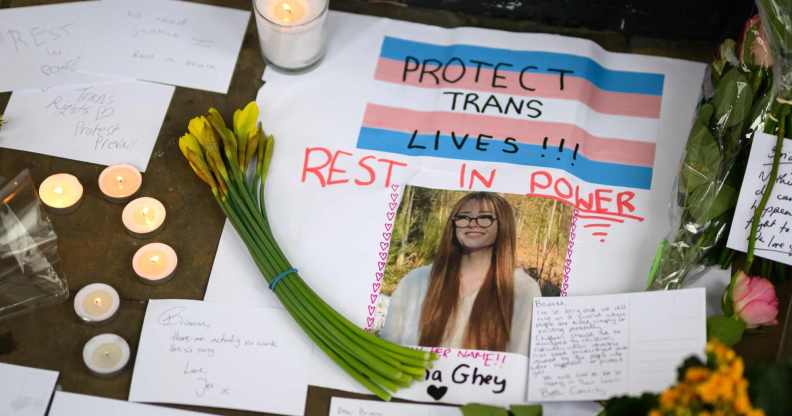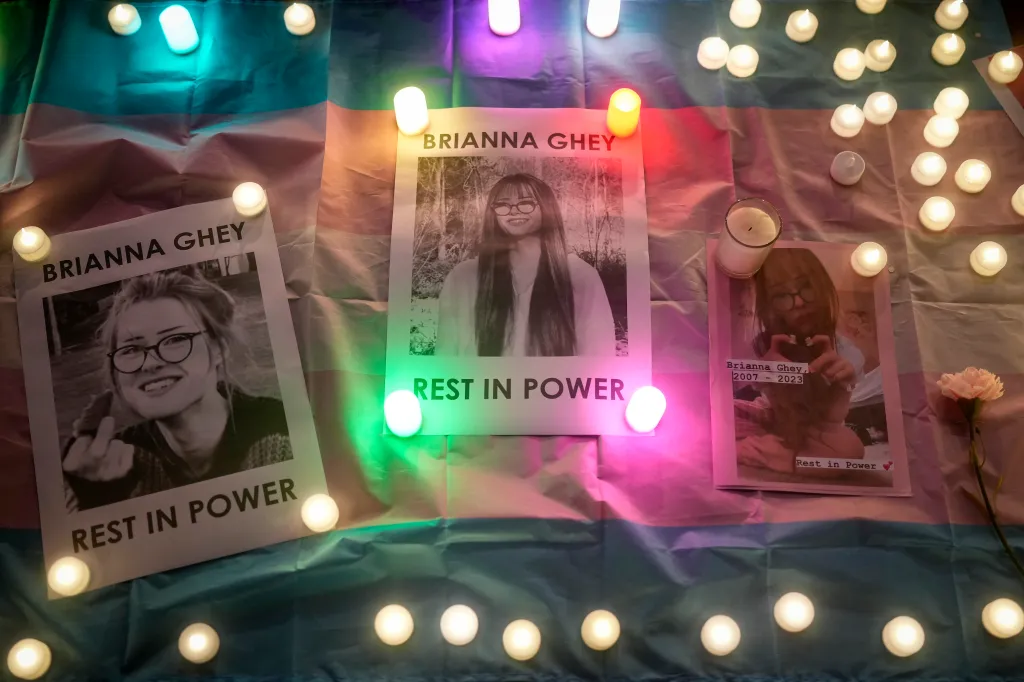Government to address calls for ‘dignity in death’ for trans people after Brianna Ghey killing

A petition is calling for reforms to the Gender Recognition Act so trans people can have dignity in death (Leon Neal/Getty Images)
A petition launched after Brianna Ghey’s death, calling for changes to the Gender Recognition Act (GRA) so trans people can be referred to by their correct gender in death, has hit 10,000 signatures.
This means the UK government must respond to it.
The petition was officially launched on 15 February, after a number of similar petitions, citing Ghey, were rejected due to referencing an “individual case”.
It urges the government to update the GRA so the “family of a dead trans person with no GRC can apply for [a] re-issued death certificate via statutory declaration” and where “a trans individual has been diagnosed with a terminal illness, they can acquire a GRC via statutory declaration”.
The petition was created by Torran Nathaniel Turner after Brianna Ghey was found with fatal stabs wounds in a park in Culcheth, Warrington, on 11 February 2023. The trans community has called on the government to give Ghey a posthumous Gender Recognition Certificate (GRC).
‘Dignity in death’
Speaking with PinkNews, Turner said: “Being recognised for who you are in death should be a right”, adding that the family and friends of dead trans people should not “have to fight with someone” for that right.
“It should be a given. The phrase I have been using throughout all of this is that it is about dignity in death.
“That is something all of us should have and it’s something that cisgender people don’t even have to worry about. Neither should we have to.”
Under current UK law, only people aged 18 and older are able to apply for, and obtain, a GRC, which allows a trans person’s gender to be recorded on birth, death and marriage certificates.
Research by the Trans Safety Network shows that a GRC is not needed for a trans person’s true gender to be registered on a death certificate as the only document legally required is the Medical Certificate of Death (s22(2)).
While Trans Safety Network legal researcher and journalist, Jess O’Thomson, says this will bring “relief” to trans people, it is not “satisfactory” as it does not stop “malicious cis family members from intentionally omitting our transness”.
O’Thomson wrote: “Rather than campaign for access to Gender Recognition Certificates, either in life or posthumously, trans people should demand something more radical – [the] abolition of legal sex markers.”

A boy and a girl, both 15 and both from Leigh, have been charged with 16-year-old Ghey’s murder. A trial date has been set for 10 July.
Given the impact Ghey’s death has had on the trans and wider LGBTQ+ community, Turner has not been surprised “at the strength of feeling” the petition has invoked.
He hopes the amendments could be bring positive change for trans people in the future.
“This has really struck a nerve. If it is something that we can translate into tangible change, I think it is really valuable at times like this.
“It’s so easy to get caught up in the doom and despair. It feels at the moment like we’re not fighting for any positive changes. We’re fighting against any negative changes.”
After reaching the initial 10,000 threshold, Turner is keen to get the petition to 100,000 signatures which would mean it could be debated in parliament.
He feels it is important for politicians to be forced to acknowledge Ghey’s death after many MPs and political leaders have failed to do so during the past week.

Last week, Mimi – not her real name – launched a Twitter campaign with the hashtag #DignityForBrianna, with the goal of getting Ghey a posthumous GRC.
“I decided to channel that into something that could help her get the dignity she deserves,” she told PinkNews.
“Everyone aside from trans people takes for granted that in death they’ll have the dignity of being remembered for who they were in life. If a trans person does not have a GRC, then this is something that is not afforded, especially if under 18.”
Mimi is calling on trans people and their allies to email their MPs and speak to their loved ones about the campaign in the hope that it will gain traction and capture the attention of Westminster.
How did this story make you feel?

